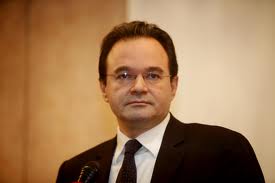George Papaconstantinou's villa on the island of Serifos, Picture: http://www.dimokratianews.gr
Former Finance Minister George Papaconstantinou, who is currently rushing at high speed to the Special Court, managed to enter politics since he was Michalis Papakonstantinou's nephew and had his strong support. Now, he is going out of politics, because he has deleted, according to the prosecution, the names of the daughters of his uncle from the notorious Lagarde list. Dimokratia Newspaper followed his path in politics.
The Papaconstantinous originate from Kozani and, as historian Dimosthenis Koukounas reveals in his book, "A family of all ages", they were favoured by the government of Tsolakoglou during the German occupation, when, thanks to just one signature, they obtained the privilege of producing and distributing electricity to Ptolemaida. In 1964, Michalis Papakonstantinou became Deputy Minister of Foreign Affairs in the government of George Papandreou. Following the change of regime, he passed over to New Democracy and the government of Mitsotakis. In 1990-1993, he was consecutively Minister of Agriculture, Justice and Foreign Affairs.

The two daughters of Michalis Papakonstantinou, who died in 2010, aged 91, did not want to be involved in politics. Thus, they opened the way to the son of his brother Sterios, George Papaconstantinou. The fact that the family made its first attempt to put this promising young man in New Democracy after 1993, at the time when Miltiadis Evert was the party's chairman, was unknown until now. However, he reacted negatively, since he didn’t believe that Papaconstantinou had the characteristics of the new wave of technocrats and politicians of the party, and, furthermore, he was not pleased with his neo-liberal ideas.
The biography of young Papaconstantinou does not contain anything enviable. He studied abroad, but occupied a low position in the Organisation for Economic Cooperation and Development and therefore sought to work his way up in Greece. Since he was not accepted in New Democracy, his mother, Cleopa, turned to PASOK, where, in the meantime, Costas Simitis, who was also the then Prime Minister, had become leader. Knowing Nikos Temelis, the right hand of the Prime Minister, she asked him to help her son, who wanted to return to the country. Simitis, because of his friendship with his uncle, replied in the affirmative and, in 1998, 37-year-old George Papaconstantinou received a post in the Council of Ministers and the Board of the then state-owned telecommunications company. Following the 2000 elections, he was appointed Special Secretary of the Ministry of Finance on Information and Society, as well as member of the Council of Economic Experts with the Ministry of Economy. He was among the staunchest supporters of Simitis and, often, his neo-liberal ideas overshadowed all other opinions. Many other supporters of Simitis, ministers and party cadres complained of Papakonstantinou's incompetence, but the Prime Minister continued to defend him.
Since he wanted to be nominated in the region of Kozani, he sought contacts among reformers' internal party circles. Via Anna Diamantopoulou, who also comes from the same region, he connected with Michalis Chrysohoidis, Secretary of PASOK, and, in 2003, he became Director of the party. When George Papandreou became leader the following year, Papaconstantinou followed Anna Diamantopoulou who put all her intra-party influence in favour of the new Chairman. But ambitious George Papaconstantinou failed during the next elections in the region of Kozani, despite Diamantopoulou's help.
During the period 2004 - 2007, he receded further and further from his patron and attached himself to Papandreou. He became his economic adviser and, in this position, in 2007, he was elected to Parliament in Kozani for the first time. Afterwards, he became a media relations representative of PASOK, a leader of the list for the elections for the European Parliament, as well as a confidante of the Papandreou family, particularly of the brothers of the former Prime Minister. Then, after the 2009 elections, he managed to eliminate Louka Katseli in the battle for the Ministry of Finance.
In addition to his popular statements on the subject of his main role in the subjugation of Greece to the International Monetary Fund and the Memorandum, Papaconstantinou started behaving more and more arrogantly and haughtily. Such an attitude he showed towards the other ministers, with most of whom he had poor, if not hostile, relationships. His personal appearances were similar, for example, when he used the Prime Minister's plane in order to go to a funeral in Rome, burdening in this way the Treasury with about 30,000 euro, and this at a time when he was trying to impose restrictive measures on the Greek society. He also manifested a similar attitude with his villa on the island of Serifos, the swimming pool of which was not declared, as was revealed. He also behaved arrogantly when, as Minister of Environment, he resorted to solving the problem of ownership of illegal construction - the same problem his mother had near Vravrona in Attica.
In the last elections, he was nominated by the region of Attica but without success. He declared that he lectures at universities and provides "consulting services" in Greece and abroad for a living. At the same time, he is trying to maintain contacts with political movements of other Papandreou "orphans", but without many prospects. Disclosures of the concealment of family members from the list of millionaires made his fall even greater.